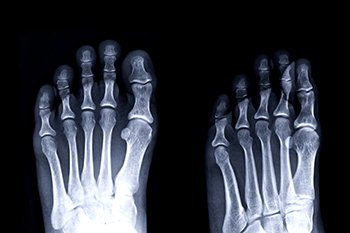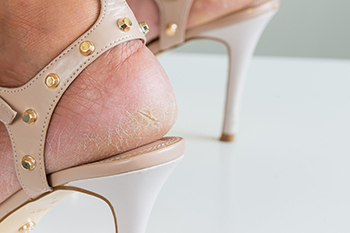Richfield (435) 896-6497
Ephraim (435) 283-4076
April 2023
Possible Reasons for Foot Pain

The feet are the workhorses of the body, absorbing shock and force whenever you stand, walk, run, or jump. Because they contain a large number of bones, tendons, muscles, and ligaments, the feet are often at risk for pain. Injury is one of the most common causes of foot pain. This category includes bone fractures, direct trauma, ligament sprains, and muscle or tendon strains. Heel or arch pain is frequently caused by a tearing of the plantar fascia, a band of tissue in the sole of the foot that connects the toes and heels. Heel pain also may be caused by bone spurs, which can be a direct result of plantar fasciitis, or of the thinning of the heel pad as you age. Bunions, hammertoes, and other bone deformities can be another source of foot and toe pain. Gout, which is an inflammatory disease caused by having excess uric acid in the body, can be extremely painful, often targeting the big toe. Nerve problems such as sesamoiditis and Morton’s neuroma are other painful conditions of the feet. If you are experiencing any type of foot pain, it is suggested that you schedule an appointment with a podiatrist who can examine your foot, and diagnose the source before recommending the appropriate treatment options.
Foot Pain
Foot pain can be extremely painful and debilitating. If you have a foot pain, consult with Dr. Blake Zobell from Utah. Our doctor will assess your condition and provide you with quality foot and ankle treatment.
Causes
Foot pain is a very broad condition that could be caused by one or more ailments. The most common include:
- Bunions
- Hammertoes
- Plantar Fasciitis
- Bone Spurs
- Corns
- Tarsal Tunnel Syndrome
- Ingrown Toenails
- Arthritis (such as Gout, Rheumatoid, and Osteoarthritis)
- Flat Feet
- Injury (from stress fractures, broken toe, foot, ankle, Achilles tendon ruptures, and sprains)
- And more
Diagnosis
To figure out the cause of foot pain, podiatrists utilize several different methods. This can range from simple visual inspections and sensation tests to X-rays and MRI scans. Prior medical history, family medical history, and any recent physical traumatic events will all be taken into consideration for a proper diagnosis.
Treatment
Treatment depends upon the cause of the foot pain. Whether it is resting, staying off the foot, or having surgery; podiatrists have a number of treatment options available for foot pain.
If you have any questions, please feel free to contact one of our offices located in Richfield and Ephraim, Utah . We offer the newest diagnostic and treatment technologies for all your foot care needs.
Recovery Time for a Stress Fracture to Heal

Repetitive overuse is often the reason why stress fractures happen. Many runners endure this foot condition from the miles and hours they spend running. Stress fractures may cause their running routine to temporarily stop. A stress fracture is defined as a hairline crack in the bone and can affect any of the foot bones. Excessive running or similar activities may cause the muscles to become tired and unable to absorb the impact as the foot strikes the ground. The bone will naturally take on this task, which can result in a stress fracture. It can be confirmed by having an X-ray performed, which precedes beginning treatment. It is beneficial to rest the foot as often as possible, and it may help to use crutches to keep weight off of the foot. The majority of patients who endure stress fractures will completely heal in approximately six weeks, and it is helpful to perform stretches that can strengthen the foot. If you have a stress fracture of the foot, it is suggested that you consult with a podiatrist who can offer you additional treatment options.
Stress fractures occur when there is a tiny crack within a bone. To learn more, contact Dr. Blake Zobell from Utah. Our doctor can provide the care you need to keep you pain free and on your feet.
How Are They Caused?
Stress fractures are the result of repetitive force being placed on the bone. Since the lower leg and feet often carry most of the body’s weight, stress fractures are likely to occur in these areas. If you rush into a new exercise, you are more likely to develop a stress fracture since you are starting too much, too soon. Pain resulting from stress fractures may go unnoticed at first, however it may start to worsen over time.
Risk Factors
- Gender – They are more commonly found in women compared to men.
- Foot Problems – People with unusual arches in their feet are more likely to develop stress fractures.
- Certain Sports – Dancers, gymnasts, tennis players, runners, and basketball players are more likely to develop stress fractures.
- Lack of Nutrients – A lack of vitamin D and calcium may weaken the bones and make you more prone to stress fractures
- Weak Bones – Osteoporosis can weaken the bones therefore resulting in stress fractures
Stress fractures do not always heal properly, so it is important that you seek help from a podiatrist if you suspect you may have one. Ignoring your stress fracture may cause it to worsen, and you may develop chronic pain as well as additional fractures.
If you have any questions, please feel free to contact one of our offices located in Richfield and Ephraim, Utah . We offer the newest diagnostic and treatment technologies for all your foot care needs.
Wounds That Don't Heal Need to Be Checked
Obesity and Foot Problems in Children

When a young child is obese, this can ultimately wreak havoc on the health of their feet and broader well-being for many reasons. First, when a child is still growing, their bones are moldable. This means that excess weight can precipitate significant changes in the structure of the feet. Second, young children who are overweight for their age might have foot conditions that, in turn, make it more difficult for them to be active. This can then contribute to a cycle that reinforces their obesity. If you are a parent caring for a young child who is overweight or obese, it is highly suggested that you schedule an appointment with a podiatrist today. A podiatrist can assist you in caring for the health of your child’s feet by answering any questions you might have or providing any treatment your child may need.
Obesity has become very problematic at this point in time and can have extremely negative effects on the feet. If you’re an obese individual and are concerned about your feet, contact Dr. Blake Zobell from Utah. Our doctor can provide the care you need to keep you pain-free and on your feet.
Obesity and Your Feet
Since your feet are what support your entire weight when standing, any additional weight can result in pain and swelling. Being overweight is one of the main contributors to foot complications.
Problems & Complications
Extra Weight – Even putting on just a few extra pounds could create serious complications for your feet. As your weight increases, your balance and body will shift, creating new stresses on your feet. This uneven weight distribution can cause pain, even while doing the simplest tasks, such as walking.
Diabetes – People who are overweight are at serious risk of developing type-2 diabetes, which has a drastic impact on the health of your feet. As you get older, your diabetes might worsen, which could lead to loss of feeling in your feet, sores, and bruises. You could also become more prone to various infections.
Plantar fasciitis – Pressure and stress that is placed on muscles, joints, and tendons can trigger plantar fasciitis, which is an inflammation of tissue that forms along the bottom of the foot.
If you have any questions please feel free to contact one of our offices located in Richfield and Ephraim, Utah . We offer the newest diagnostic and treatment technologies for all your foot and ankle needs.
Summer and Winter Months May Cause Cracked Heels

The winter months can cause the skin on the heels to become dry and ultimately crack. It can cause pain and discomfort, and deep cracks which are known as fissures, may bleed and become infected. Cracked heels can also develop during the summer months, and this may be a result of wearing shoes that have an open back, such as flip-flops or sandals. Additionally, there may be existing medical conditions that can cause cracked heels. These can include eczema and psoriasis, which may cause a lack of moisture in the skin. The moisture levels in the skin may also be affected by using hot water from taking a hot shower. Replenishment of these levels can increase by drinking plenty of water daily, in addition to consuming hydrated foods. People who have diabetes may be prone to developing cracked heels. Neuropathy, which is a common condition among diabetic patients, may cause the skin to lose moisture, possibly resulting in this uncomfortable foot condition. If you have developed cracked heels, it is suggested that you consult with a podiatrist who can help you to find permanent relief, by possibly prescribing medicine.
Cracked heels are unsightly and can cause further damage to your shoes and feet. If you have any concerns, contact Dr. Blake Zobell from Utah. Our doctor can provide the care you need to keep you pain-free and on your feet.
Cracked Heels
Cracked heels appear unappealing and can make it harder for you walk around in sandals. Aside from looking unpleasant, cracked heels can also tear stockings, socks, and wear out your shoes. There are several methods to help restore a cracked heel and prevent further damage.
How Do You Get Them?
Dry skin is the number one culprit in creating cracked heels. Many athletes, walkers, joggers, and even swimmers suffer from cracked heels. Age and skin oil production play a role to getting cracked heels as well.
Promote Healing
Over the counter medicines can help, especially for those that need instant relief or who suffer from chronic dry feet.
Wear Socks – Wearing socks with medicated creams helps lock in moisture.
Moisturizers – Applying both day and night will help alleviate dryness which causes cracking.
Pumice Stones – These exfoliate and remove dead skin, which allows for smoother moisturizer application and better absorption into the skin.
Change in Diet
Eating healthy with a well-balanced diet will give the skin a fresh and radiant look. Your body responds to the kinds of food you ingest. Omega-3 fatty acids and zinc supplements can also revitalize skin tissue.
Most importantly, seek professional help if unsure how to proceed in treating cracked heels. A podiatrist will help you with any questions or information needed.
If you have any questions, please feel free to contact one of our offices located in Richfield and Ephraim, Utah . We offer the newest diagnostic and treatment technologies for all your foot care needs.









